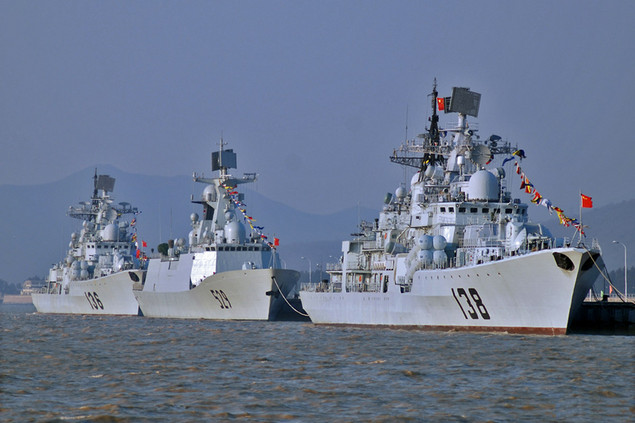當中國統治海洋,美國不再是全球海軍的主要力量.
本文的作者是正確的分析出,中國遠洋深藍海軍戰略意志及其實現的可能性,其目的是在警告美國當局的海軍戰略計劃,以及美國政府對待中國的態度,自第二次世界大戰以來,美國海軍霸全世界,在冷戰的末期,搞垮了蘇聯海軍,美國始終保持以10艘航空母艦的戰鬥群,24小時巡弋世界的大海洋,誰人知曉中國海軍竟以後起之秀的警急追趕,目前的的戰鬥力僅次於俄羅斯共和國,排名世界第三位,西方戰略觀察家分析認為,中國海軍將在2040年,左右時期與美國海軍並駕齊驅,甚至於在某些海軍項目裡,超越美國海軍的戰鬥力.
因為上一世紀的中國毛主席曾經戰略性指示出,他們洋人有的各式各樣的軍艦,我們中國海軍也要有,而且要好,要新,要超越洋人的兵艦.中國海軍稟持國有軍艦國自行設計,施工,建造經過50年的驗證發展,如今強勢的中國海軍崛起,從無到有,像是變魔術般似的生出各式各樣的軍艦,無論是驅逐艦,巡防艦,常規潛艦以及核子潛艦,甚至於航空母艦,中國海軍現今都可以自我滿足,建軍所需,更何況其他種類的軍艦,諸如最新的重型導向飛彈驅逐艦以及重型導向飛彈核子動力巡洋艦.當然核子動力航空母艦更不在話下.中國海軍的素質愈來愈好,愈來愈精,以可以比擬西方諸國的海軍水準.否則愈來愈多的國際海軍軍演,邀請中國海軍參加是玩假的?

自從201509月初中國的海軍的一個遠洋艦隊出現在美國阿拉斯加水域,習近平於20150924日訪問華盛頓前的幾個星期。事實上,中國共產黨領導人,明顯指示軍艦行駛合法的公海航行,中國海軍通過阿留申群島的美國領海邊緣,進入阿拉斯加海岸。 5艘中國戰艦巡航白令海海域 而引起華盛頓的一個恰當低調回應:“中國是一個全球性的海軍”美國海軍發言人表示,“我們鼓勵中國和其他國際海軍在國際水域的運作只要堅持安全和職業標準和大海洋的海事法“。
為什麼中國遠征西半球北部的海域?因為它看到了未來在遠海存在的價值。而且因為它可以得到相當的戰略利益:北京不再完全懼怕外界的遠洋作戰艦隊,現在它可以依靠自己的艦隊以及遠程精確打擊火力,以抵禦中國的威脅海域。
因此,這個人民解放軍海軍(PLAN)艦隊可以乘船遊覽太平洋和印度洋,甚至穿超越了北極海深處,離家很遠的水域去進行維護,以往已經喪失中國的利益。
自從1850年的鴉片戰爭以來至1895年甲午戰爭,中國海軍幾乎全軍覆沒,以後中國再也沒有海軍力量,來抗衡外國的船堅炮厲的侵華戰爭,中國任由外國人宰割,訂立各種不平等的喪權辱國條約,直到1949年中華人民共和國成立,這將近100年來,中國海軍始終是一片空白,無法記載於歷史檔案裡.這是中國人的恥辱,尤其甚者就是中國海軍的惡夢記憶猶新.

對於中國來說,範圍廣泛的海洋戰略的有利的,一面是眾多的和令人信服的缺點越來越少。該計劃的阿留申群島的逗留是習近平的項目,使中國這樣一個由傳統的陸權大國,最新轉變成為到他所謂的“真正的海上強國” - “中國夢”,並幫助國家履行這樣的願望將形成一股暗流,他與美國總統奧巴馬之間的討論,似乎有關於中國建立藍水海軍自信的新時代正在向我們美國走來。


WHEN CHINA RULES THE SEA.
The United States is no longer the world’s only global naval power.
The United States is no longer the world’s only global naval power.
當中國統治海洋,美國不再是全球海軍的主要力量.

When China Rules the Sea 
A flotilla from China’s navy appeared in American waters in early September, a few weeks before President Xi Jinping’s Sept. 24 visit to Washington. Indeed, Chinese Communist Party chieftains evidently instructed warships to take shortcuts — lawful ones, I hasten to add — through U.S. territorial waters in the Aleutians, off the coast of Alaska. Five vessels cruised the Bering Sea in early September — and elicited a fittingly low-key response from Washington: “China is a global navy,” declared one U.S. Navy spokesman, “and we encourage them and other international navies to operate in international waters as long as they adhere to safe and professional standards and maritime laws of the sea.”
Why would China go to the trouble and expense of mounting an expedition to the northern climes in the Western Hemisphere? Because it sees value in staging a presence in distant waters. And because it can: Beijing no longer depends completely on its oceangoing battle fleet to ward off threats in China’s seas. It can now rain long-range precision firepower on enemy fleets from land. Ergo, the People’s Liberation Army Navy (PLAN) fleet can cruise the far reaches of the Pacific and Indian oceans or even beyond, without forfeiting China’s interests in waters close to home.
For China, the upsides of far-ranging maritime strategy are many and compelling, the downsides fewer and fewer. The PLAN’s Aleutians sojourn is the latest expression of Xi’s project to make China, a traditional continental power, into what he calls a “true maritime power” — and helping the nation fulfill its “Chinese dream.” Such aspirations will form an undercurrent to discussions between him and U.S. President Barack Obama. The takeaway? A new age of Chinese bluewater assertiveness is upon us.
What does Beijing stand to gain from a venturesome maritime strategy? A lot. Consider the location of its recent foray: The Bering Strait constitutes the most convenient entryway to the Arctic Ocean for Chinese merchant and naval vessels. Assuming the ice recedes as climate change advances, polar shipping routes will prove shorter and less convoluted — and thus less expensive and troublesome — than current alternatives. Consequently, it makes perfect sense for the PLAN to